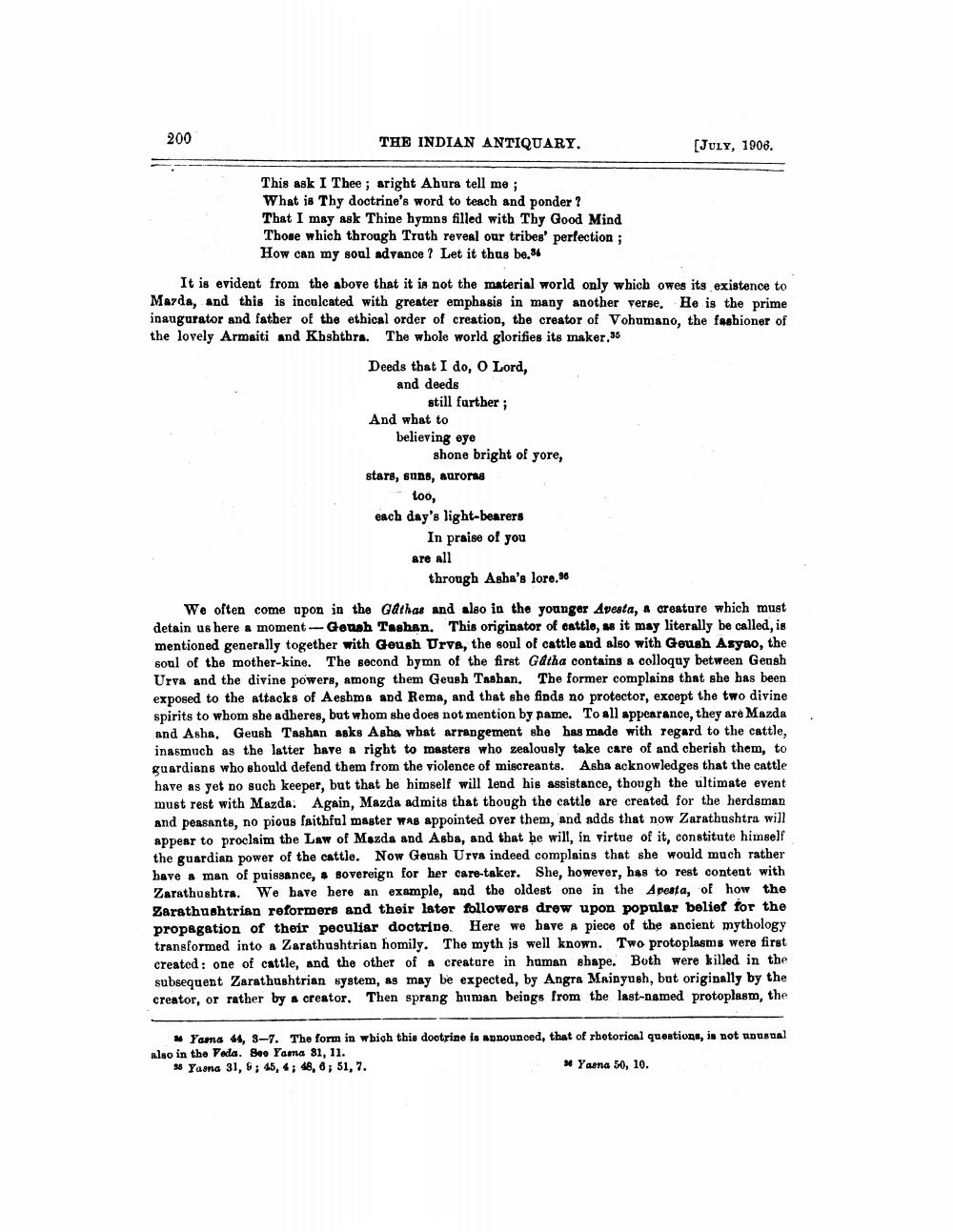________________
200
THE INDIAN ANTIQUARY.
This ask I Thee; aright Ahura tell me ; What is Thy doctrine's word to teach and ponder? That I may ask Thine hymns filled with Thy Good Mind Those which through Truth reveal our tribes' perfection; How can my soul advance? Let it thus be.3%
It is evident from the above that it is not the material world only which owes its existence to Mazda, and this is inculcated with greater emphasis in many another verse. He is the prime inaugurator and father of the ethical order of creation, the creator of Vohumano, the fashioner of the lovely Armaiti and Khshthra. The whole world glorifies its maker,35 Deeds that I do, O Lord, and deeds
still further;
And what to believing eye
shone bright of yore,
stars, suns, auroras
100,
each day's light-bearers In praise of you are all
[JULY, 1906.
through Asha's lore.96
We often come upon in the Gathas and also in the younger Avesta, a creature which must detain us here a moment-Geush Tashan. This originator of cattle, as it may literally be called, is mentioned generally together with Geush Urva, the soul of cattle and also with Geush Asyao, the soul of the mother-kine. The second hymn of the first Gatha contains a colloquy between Gensh Urva and the divine powers, among them Geush Tashan. The former complains that she has been exposed to the attacks of Aeshma and Rema, and that she finds no protector, except the two divine spirits to whom she adheres, but whom she does not mention by name. To all appearance, they are Mazda and Asha, Geush Tashan asks Asha what arrangement she has made with regard to the cattle, inasmuch as the latter have a right to masters who zealously take care of and cherish them, to guardians who should defend them from the violence of miscreants. Asha acknowledges that the cattle have as yet no such keeper, but that he himself will lend his assistance, though the ultimate event must rest with Mazda. Again, Mazda admits that though the cattle are created for the herdsman and peasants, no pious faithful master was appointed over them, and adds that now Zarathushtra will appear to proclaim the Law of Mazda and Asba, and that he will, in virtue of it, constitute himself the guardian power of the cattle. Now Geush Urva indeed complains that she would much rather have a man of puissance, a sovereign for her care-taker. She, however, has to rest content with Zarathushtra. We have here an example, and the oldest one in the Avesta, of how the Zarathushtrian reformers and their later followers drew upon popular belief for the propagation of their peculiar doctrine. Here we have a piece of the ancient mythology transformed into a Zarathushtrian homily. The myth is well known. Two protoplasms were first created: one of cattle, and the other of a creature in human shape. Both were killed in the subsequent Zarathushtrian system, as may be expected, by Angra Mainyush, but originally by the creator, or rather by a creator. Then sprang human beings from the last-named protoplasm, the
Yasna 44, 3-7. The form in which this doctrine is announced, that of rhetorical questions, is not unusual also in the Veda. See Yaena 31, 11. se Yasna 50, 10.
55 Yasna 31, ; 45, 4; 48, 6; 51, 7.




